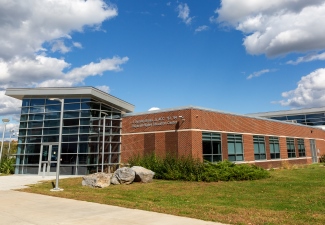Emma Mackey - Model Organization of American States (MOAS) Program Transforms Lives | SUNY Plattsburgh
When Emma Mackey journeyed from her high school in Corinth, N.Y., to SUNY Plattsburgh’s Model Organization of American States three years ago, she didn’t know it would change her life.
The annual high school Model OAS brings together more than 200 students from 13 high schools. Students act as representatives from countries across the Americas and learn about hot-button political issues — as well as more long-term economic, social and environmental problems — while developing skills in research, diplomatic affairs, parliamentary procedure and debate.
Challenging and Fun
Going into it, Mackey said she was scared.
“We’ve all become very good at research because we are constantly doing it. And my public speaking skills have probably grown tenfold.” — Emma Mackey
“I thought it was going to be just really challenging, and it was, but I hadn’t anticipated how much fun it was going to be, too,” Mackey said.
Immediately after high school, Mackey went to Rochester Institute of Technology to study sign language, but, when she decided to switch her major to Spanish, she came back to Plattsburgh where she could double major in Latin American Studies and take part in the college-level Model OAS, competing against other institutions across the Americas in Washington, D.C.
Since then, she’s made the D.C. trip twice and says it has been the best part of her college career, not only because of the closeness it has fostered between her and her classmates, but also because of the academic rigor involved.
Developing Students’ Potential
This summer, Mackey put her experience to work when she helped run the high school model.
“You really see the best come out of the high school students,” she said. “They have so much potential. It’s satisfying to be able to guide them and help them with the process.”
She’s not the only one amazed by what she saw. Dr. Stuart Voss, the coordinator of both OAS Models noted that there were unique visitors to this year’s high school program — faculty from the University of Kansas and the University of the District of Columbia. They were gathering ideas for similar programs at their own schools.
“Not only has our Model OAS convinced them that such an undertaking is doable, but, yesterday, at the faculty meeting, they told us that they have just been ‘blown away’ at the preparedness of the high school students and at the level of intellectual engagement,” Voss said. “They also praised our Latin American Studies student officers at the model for their mentoring leadership and the smooth flow of committee sessions.
“It has been quite a confirmation of the Model OAS curriculum we have fashioned for our university program and then adapted to the freshmen college level for the high school students,” he said. “As the teachers said over and over yesterday – it transforms so many of their students’ lives.”
News

SUNY Adirondack Students Benefit from New Dual Agreement with SUNY Plattsburgh Queensbury
